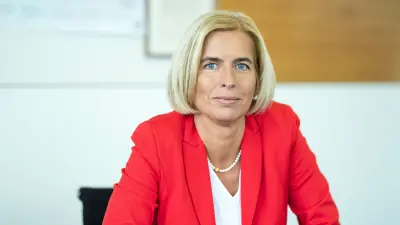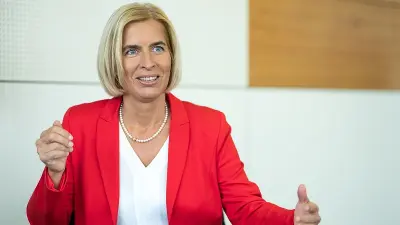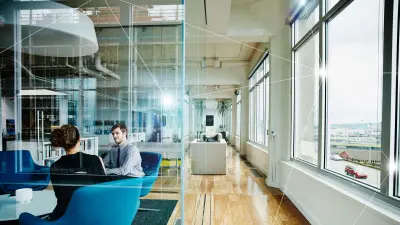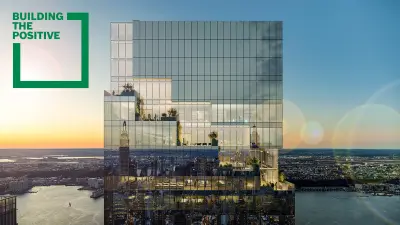“Creating added value for the customer”
Tanja Rückert had been President of the Board of Management for Bosch Building Technologies since August 2018. Effective as of July 1, 2021, she has taken over the role of Chief Digital Officer for the Bosch group. In this interview, the former SAP top manager explains the significant opportunities that IoT offers, particularly in the area of security and building technology.

Ms Rückert, have you made your life easier today with the help of digital features?
I’d say our home is already pretty smart and networked, and we use some digital ‘helpers’ in our daily lives. It starts with controlling the lights or blinds and ends with energy management. We control some things via an app, a lot – like for instance light or music – is done via voice control. Particularly when one’s out of the house, the ability to control devices at home remotely using your smartphone or tablet is very practical, and energy saving of course.
How does someone with a PhD in Chemistry become an expert in the software industry?
While I was studying Chemistry I realized that I prefer to work with people than just in the lab. I wanted to be involved in more than ‘logical, chemical reactions with often surprisingly color ful outcomes.’ That’s why I also completed a business economics foundation course alongside my PhD. At SAP, I then had the opportunity to advise companies from the chemicals industry on software implementation – which was naturally a very good fit. Over the years my passion for software and, coupled with this, for topics such as IoT, digital transformation, and Artificial Intelligence (AI), has been growing. It emerged and was also consolidated by the very close cooperation with many customers from extremely diverse sectors and regions, whose businesses were heavily impacted by increasing digitalization. The impact of IoT on our lives will become much greater than many people anticipate today. IoT will change our world. It does not only entail technical devices and new software. What’s crucial is that all data and information is available in real time.
So have you switched from the theoretical to the practical side of things, so to speak?
Let me put it another way: First of all, in the software industry you are more directly involved with the Internet and cloud applications. But to a certain extent you are designing a ’castle in the sky in software form.’ Whether everything will fit together and work in practice in the end is a different matter. So what particularly fascinates me about Bosch are the ‘things,’ the hardware, the place where data is generated, so to speak. It’s about the combination of hardware and software, about the benefit of real data, about sensors, actuators. This is what I’m more involved in now and I can actively help to design and therefore implement things I could only previously describe.
How does that impact your tasks at Bosch Building Technologies?
As president of the management board, I’m primarily responsible for strategy, technology, and innovation in close collaboration with our customers and partners. Here I can contribute my knowledge of IoT, AI, and analytics and combine it with the exceptional expertise of the whole team and products of Bosch. It’s precisely this combination that we want to use to offer an attractive overall solution for our customers, which provides maximum added value. This customer focus and the close cooperation in our partner network is one of the reasons why I was looking forward to this role.

What objectives are you pursuing?
We want to offer comprehensive solutions. Thanks to increasing connectivity and the intelligent use of data, we can add new models and offerings to our traditional business that tended to be rather product-oriented. This means we are combining hardware, software, and services so that the benefit for our customers goes far beyond that from previous silo solutions. Our strong customer focus and in-depth product knowledge mean we are perfectly equipped for using IoT and AI. This will also create added value for our partners and customers. But we’re also providing comprehensive, smart solutions today.
Can you give us some examples?
In a typical building project, like the NOVE office complex in Munich, networked use and integration of safety and security aspects from a single source is key, for example. In a safety and security project like the Eurasia Tunnel in Istanbul, where video analysis and fire detection technology are used, networked systems ensure that traffic flows smoothly and safely. And in the J-Village – the new home of the Italian football giant Juventus – an integrated energy solution, including maintenance and monitoring, ensures very efficient energy management.
Can you see further potential here?
Absolutely. We have already done a lot of work regarding the connectivity of our products and are now taking the next steps with services such as in-store analytics or the video-based fire detection system Aviotec. Another example is condition monitoring, a service that builds on remote maintenance. This gives customers an ongoing overview of the condition of a system, for example, the degree to which a fire detector is contaminated. This enables maintenance work and necessary investment to be planned in advance and to avoid system malfunctions. But there will also be many other steps to follow. Particularly in the area of security and building technology we have the opportunity to bring together all aspects of IoT and digitalization – i.e. hardware, software, data, and new technologies like artificial intelligence – and to create solutions for our customers that are of considerable value. I find it very exciting to be part of this development.
Where do you see the biggest opportunities in the future for ‘creating added value for the customer’?
For me there are three areas in particular: connectivity and intelligence, sustainability, and security. That means that the manufacturer’s promises to be able to use data more intelligently are also realized in practice. Through our close customer contact and by combining technical expertise with new technologies we are perfectly positioned to create this real benefit. Also, it’s increasingly about sustainability. In buildings this particularly means the increasing need for efficiency, so automation and control systems are needed, and energy consulting will ultimately also play an increasingly important role. And finally in a global world security in itself is important. Alongside the safety of people, this also means data security. The need for security was and still is a very important one. I think it’s great that, as industry experts, we can contribute to fulfilling this need.


